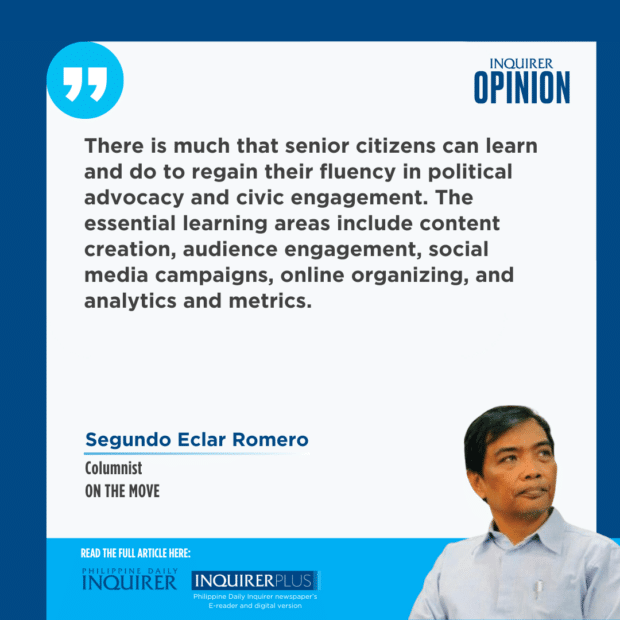Senior citizen activism in the digital age

During the recent Christmas holidays, I attended several reunions with my high school and college classmates, now all senior citizens. I also participated in spirited group chats on social media. There was a palpable sense of nostalgia as we reminisced about the “good old days” when student activism was almost second nature—practically a part of the curriculum. These gatherings were filled with insightful observations and lively recommendations on how politicians, institutions, and government agencies should design and implement programs, such as the Ayuda sa Kapos ang Kita Program.
What struck me most was the depth of knowledge and networks that these groups exhibited. Many of my peers spoke personally and intimately about various politicians—senators, congressmen, governors, mayors, secretaries, and undersecretaries. This wasn’t mere name-dropping or boasting; many of these seniors had served in high-ranking positions in government, corporate management, or civic organizations. Their connections were real, cultivated through decades of public service and professional experience.
However, a frustrating gap emerged when the discussions moved beyond analysis and commentary to the practical task of crafting policy statements, open letters, or other communications for policymakers. Many senior citizens found themselves at a loss, unsure of how to navigate the modern tools and methods that have displaced the traditional avenues of political advocacy.
Article continues after this advertisementSome seniors have successfully adapted to the digital age, proving that it is never too late to learn. Notable figures such as Pong Ejercito (corporate sector), Jerry Quibilan (civic sector), Ted Mendoza (agriculture sector), Ike Seneres (IT sector), and Cesar Gomez (business sector) effectively use email, group chats, Facebook, and Zoom to reach out to political leaders, government officials, and influencers in various sectors of society. Many retired academics and scientists also seek ways to contribute to policy discussions in their areas of expertise.
Yet, for the majority, there is a strong sense of disconnect. The modern tools of advocacy—social media, live streaming, webinars, and online organizing—are unfamiliar and intimidating. As a result, many senior citizens feel disarmed and excluded from meaningful participation in democratic politics.
For instance, while some seniors are proficient in using email, Messenger, and Viber group chats, they struggle with more advanced tools like Facebook Live, YouTube webinars, and online collaboration platforms like Mural. Many retired professors, once leaders in education and critical discourse, are unfamiliar with learning management systems like Canvas or Microsoft Teams, which now dominate the education landscape.
Article continues after this advertisementSenior citizen activists from the 1970s and 1980s were once adept at traditional methods of influencing politics and government. They marched in protests, wrote editorials, and participated in face-to-face organizing. Today, those same activists find themselves marginalized in a world where political engagement has shifted to social media platforms, hashtags, and viral content.
The irony is that while social media enables unprecedented levels of participation, it also amplifies inane, sensational, and fake content, drowning out serious, responsible discourse. This noise makes it even harder for seniors, who are less familiar with these platforms, to make their voices heard.
There is much that senior citizens can learn and do to regain their fluency in political advocacy and civic engagement. The essential learning areas include content creation, audience engagement, social media campaigns, online organizing, and analytics and metrics.
Seniors can update themselves through free online courses, webinars, and workshops. Joining digital advocacy networks and participating in intergenerational mentorship programs—where youth activists teach seniors about digital tools while learning from their historical knowledge—can bridge the generational divide in activism.
While individual efforts are vital, systematic institutional support is crucial for empowering senior citizens in the digital age. Organizations mandated to support senior citizens should take the lead in enabling digital literacy and online advocacy. These organizations include the Federation of Senior Citizens Associations of the Philippines, the Office of the Senior Citizens Affairs in local government units, the Coalition of Services of the Elderly, Inc., the Tech4ED Centers, and the Philippine Foundation for the Care of Older Persons.
The best time to act on this was 10 years ago. The second best time is now.
As the country approaches the crucial May 2025 elections and continues to grapple with socioeconomic challenges, the voices of senior citizens must not be lost. By embracing modern tools of advocacy, they can amplify their efforts, reach wider audiences, and continue to play a vital role in shaping the nation’s future.
—————-
















